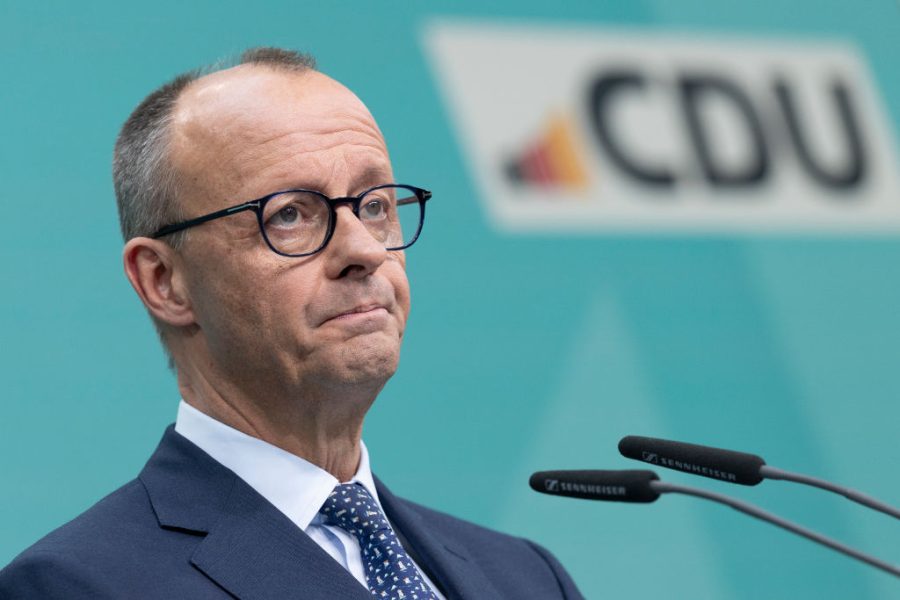It’s not just in Britain that defence spending is top of the agenda. In Germany, too, the debate has turned to how the government can resurrect the country’s hollowed-out armed forces. Friedrich Merz, leader of the CDU and the man pipped to become the next chancellor, is driving the discussion. But unlike the grudgingly positive response Prime Minister Keir Starmer has received for pledging to increase UK defence spending to 2.5 per cent of GDP over the next two years, Merz is blundering his way into an almighty row – and possibly a constitutional crisis.
The final vote in Sunday’s federal election had not been fully counted before Merz, whose party won, declared on live television that his ‘absolute priority’ would be to strengthen Europe’s defences in response to what he called US President Donald Trump’s ‘indifference to the fate of Europe’. With the question of defence barely featuring in Germany’s two-month election campaign, this marked a key change for the CDU leader.
Neither of the options available to Merz are particularly savoury
For Merz, bolstering Europe’s defences against Russia begins at home. Reports suggest he has his sights set on boosting spending by €200 billion (£165 billion). Nevertheless, with Germany’s defence spending having only just reached 2 per cent of GDP last year – far below Trump’s demands for 5 per cent – critics have already suggested this figure will fall short of what’s truly needed.
Merz isn’t the first leader to talk big on boosting Germany’s depleted forces. Exactly three years ago yesterday, incumbent SPD chancellor Olaf Scholz stood up in front of the Bundestag to give his now infamous ‘Zeitenwende’ speech. Talking about how Putin’s invasion of Ukraine had brought Europe to a crossroads – ‘a changing of the times’ – Scholz declared that this obliged Germany to get serious on defence. In the speech, he revealed that a special fund of €100 billion (£83 billion) would be allocated to reinvigorate the Bundeswehr.
Scholz’s special fund is expected to run out by 2027, a result of stock being sent to Kyiv and inflation. The money also barely addressed the glaring issues the Bundeswehr has with the recruitment and retention of troops. This means that should Germany ever need to send soldiers as part of a peace-keeping force in Ukraine, alongside existing commitments in Lithuania and other Baltic states, it will seriously struggle to do so.
The question for Merz is how to successfully raise Germany’s defence budget. As in Britain, the German economic outlook paints a bleak picture. The economy has seen no growth for several years. And the constitutional debt brake that prevents the government from exceeding a certain threshold of borrowing has been pushed to its limit.
Neither of the options available to Merz are particularly savoury. To up Germany’s defence spending, he will need to either reform the debt brake or create a second special fund. The problem for the likely chancellor is that the legislation for both is grounded in Germany’s constitution, meaning that a two-thirds majority vote is needed in the Bundestag to pass it.
Just six days on from Germany’s election, the country finds itself in a strange political limbo. Merz has yet to formally start negotiations with his most likely coalition partner, the SPD, let alone discuss how they might fund a raise in defence spending. They are reportedly due to meet on Tuesday for the first time. Merz is also still at least a month, if not two, away from being voted in as chancellor. In the meantime, Scholz’s government remains in charge as caretakers until the CDU leader can take over.
Having firmly rejected reforming the debt brake during the election campaign, Merz once again ruled out this option this week. But the alternative – creating a special fund – will also be an uphill battle for the CDU leader.
Sunday’s election result saw the far-right Alternative für Deutschland (AfD) party come in second place with just over 20 per cent of the vote. The left-wing Linke party also did far better in the election than expected, winning 8.8 per cent of the vote. Part of their last-minute boost in the polls has been attributed to Merz’s decision to collaborate with the AfD on a non-binding vote on migration in January.
Together, the AfD and Linke parties now have enough seats – a combined 216 of 630 – to jointly form a so-called ‘blocking minority’ in the new parliament. With this, they could successfully vote down any constitutional votes Merz’s government wants to put forward – including on forming a new special fund for defence. Die Linke have already confirmed that they would do so. The AfD will almost certainly follow suit.
To get around this, Merz is said to be eyeing up a risky solution. According to German law, the new parliament must meet by 25 March for the first time. To avoid having to hold the vote on a special defence fund after that point, Merz reportedly wants to call a sitting of the old parliament – as it stood before the election – to push it through instead. Thanks to its old composition, the CDU, SPD, FDP (which was booted out of parliament in Sunday’s vote) and the Greens would together have the two-thirds majority needed to successfully push the motion through.
Sure enough, the possibility that this might happen has prompted outrage from many of Merz’s opponents. Questions have arisen whether such a move would be constitutionally possible: there has only been one instance since 1990 when a lame duck parliament has successfully pushed through a constitutional vote following an election. The AfD has declared that any attempt to use the old parliament to push through such votes would amount to a ‘coup’.
If Merz manages to bring the old parliament together to vote this through, he will find it difficult to shake off accusations of playing dirty political tricks before he has even become chancellor. Merz’s argument is that Germany’s domestic security and defence is a top priority in the shifting geopolitical sands of today’s world. He may even think that the risk he is taking to try and increase the country’s defence spending is worth it for this reason. It’s hard to avoid the impression, though, that he has landed in a mess of his own making. He has less than four weeks to unmake it.








Comments